Since its foundation in 1995, CLEA has been organizing public research seminars, typically about twenty per academic year. For previous series, see the Past seminars and ECCO seminars. For an overview of all seminars, look here. Some of these seminars have been organized in series on specific topics, such as COT x Music, or Longevity+.
What?
Speakers present their ongoing research on various topics within the broad, multidisciplinary CLEA domains and then get feedback from the audience. The intention is to discuss in depth the ideas and issues proposed and to look for transdisciplinary connections with other topics. Speakers are requested to avoid technicalities so that people from different backgrounds can follow their presentation.
A seminar typically lasts two hours, with about one hour presentation and one hour discussion. Video recordings are usually streamed live via Zoom and afterwards published on our YouTube channel.
For whom?
Everyone interested in the topic. The discussions are informal and interactive. Most participants are experienced researchers and CLEA affiliates, but we regularly welcome students and people from outside academia. Depending on the topic, live audiences are about 8-20 people, but video recordings may reach thousands of views.
Where ?
The seminars are given both online via the ZOOM platform and on the main VUB campus, typically in room D.1.07, or occasionally in the CLEA house. After the seminar, participants usually go to the nearby Opinio cafe on campus to continue the discussion in a more relaxed atmosphere, with a beer or a coffee.
How do I keep informed?
You can subscribe to our mailing list where we announce seminars about 5 days in advance. You can also subscribe to our public Google Calendar. Seminars are further announced on our website (this page), our Facebook page and LinkedIn page.
If you are interested to present your own research in one of our series, please contact Marta Lenartowicz with your proposal and check the Instructions for people preparing to present a seminar.
Seminars in 2022/23
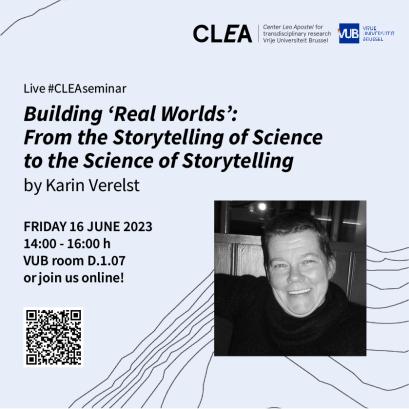 Practical info16/06/2023 - 14:00 - 16/06/2023 - 16:00
Practical info16/06/2023 - 14:00 - 16/06/2023 - 16:00CLEA SEMINAR. Building ‘Real Worlds’: From the Storytelling of Science to the Science of Storytelling - by Karin Verelst
In this seminar, Karin Verelst will explore the deep connections between worldbuilding in the scenic arts (in the largest sense) and rational/scientific worldview construction, from classical metaphysics up to modern science. FOR MORE INFO > PLEASE CLICK TITLE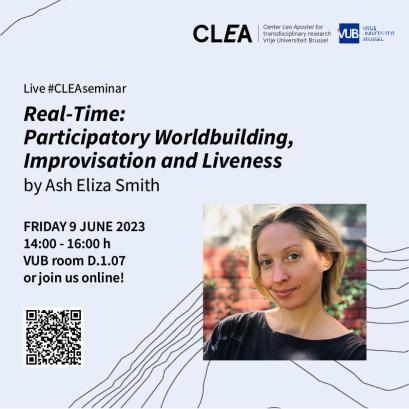 Practical info09/06/2023 - 14:00 - 09/06/2023 - 16:00
Practical info09/06/2023 - 14:00 - 09/06/2023 - 16:00CLEA SEMINAR. Real-Time: Participatory Worldbuilding, Improvisation and Liveness - by Ash Eliza Smith
This talk is about 'Real-Time', a way of thinking about time and re-designing time. It explores how Worldbuilding and Speculative Design relate to co-creation and the dynamics of human-machine experiences, and how they apply to re-imaging place with a 'substance use disorder community'. FOR MORE INFO > PLEASE CLICK TITLE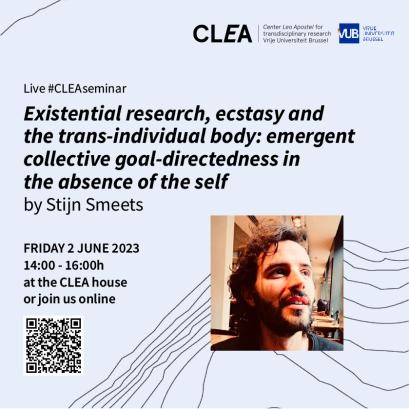 Practical info02/06/2023 - 14:00 - 02/06/2023 - 16:00
Practical info02/06/2023 - 14:00 - 02/06/2023 - 16:00CLEA SEMINAR. Existential research, ecstasy and the trans-individual body: emergent collective goal-directedness in the absence of the self - by Stijn Smeets
Existential research is the embodied exploration of different ways of being human. Its experiments aim at exposing or altering (internalised) power structures that limit how we think, feel, speak, and move. Typical examples include the practices of sensorial deprivation (a darkness retreat), time alteration (walking in slow motion) or communication protocols (radical honesty). In this seminar, Stijn Smeets invites participants to join an embodied investigation of emergent goal-directedness using some of the above practices to induce altered states of consciousness, enable emergent collective goal-directedness and the experience of a trans-individual body. FOR MORE INFO > PLEASE CLICK TITLE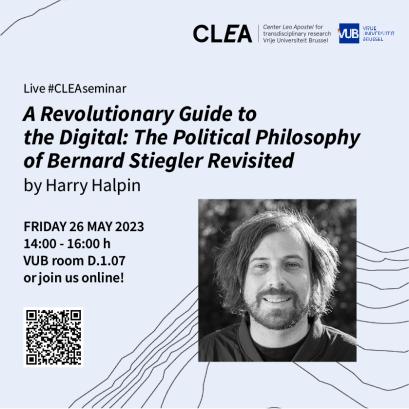 Practical info26/05/2023 - 14:00 - 26/05/2023 - 16:00
Practical info26/05/2023 - 14:00 - 26/05/2023 - 16:00CLEA SEMINAR. A Revolutionary Guide to the Digital: The Political Philosophy of Bernard Stiegler Revisited - by Harry Halpin
What is to be done in the era of the digital? Bernard Steigler, the late French philosopher of technology, is perhaps most known for his analysis of technology's primary role in shaping humanity. What he is less well-known for is his totalizing and radical analysis of contemporary digital capitalism and climate change, which Harry Halpin will delve into during this lecture. FOR MORE INFO > PLEASE CLICK TITLE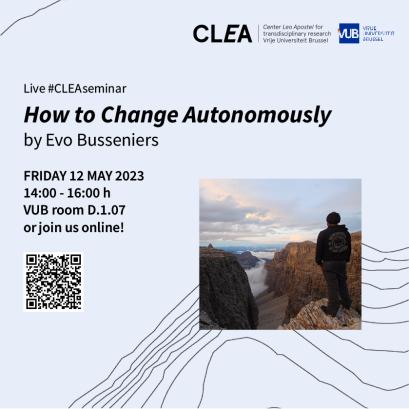 Practical info12/05/2023 - 14:00 - 12/05/2023 - 16:00
Practical info12/05/2023 - 14:00 - 12/05/2023 - 16:00CLEA SEMINAR. How to Change Autonomously - by Evo Busseniers
In this seminar, Evo Busseniers will present a model that demonstrates how a system can transform through its internal dynamics, rather than being changed by external forces. He will discuss the limitations of the current model, explore the concept of autonomous change through a game, and delve into a model that demonstrates how a system can change itself by creating new constraints that influence its behaviour. Finally, he will apply these concepts to concrete cases in smaller groups during the seminar. FOR MORE INFO > PLEASE CLICK TITLE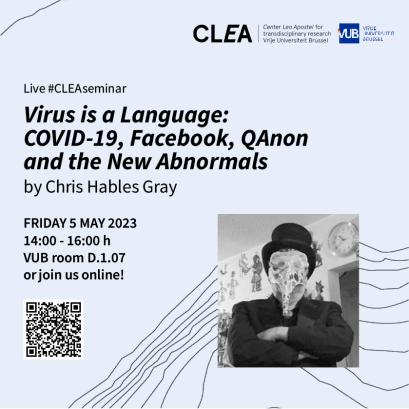 Practical info05/05/2023 - 14:00 - 05/05/2023 - 16:00
Practical info05/05/2023 - 14:00 - 05/05/2023 - 16:00CLEA SEMINAR. Virus is a Language: COVID-19, Facebook, QAnon and the New Abnormals - by Chris Hables Gray
In this seminar, Chris Hables Gray will talk about the value of seeing Virus as a language we must speak. Only by drawing on viral principles can the core dynamics of our 21st century Virus Crisis be understood. Our crisis isn’t just biological, it is also about ideas and how they propagate. Why evolution produces humans with their self-organizing complexity and agency, who are able to create social systems (including the rapidly expanding digital realm), is an important mystery. Understanding this and other aspects of viral phenomena and their environments, is crucial. Speaking Virus is not just about learning how these different realms work, it is about the role of human and other agency and choosing to cooperate with the viral and controlling our contributions to it. In this way, we could make ourselves and our environments more resilient, giving us a chance to survive, perhaps even thrive. FOR MORE INFO > PLEASE CLICK TITLE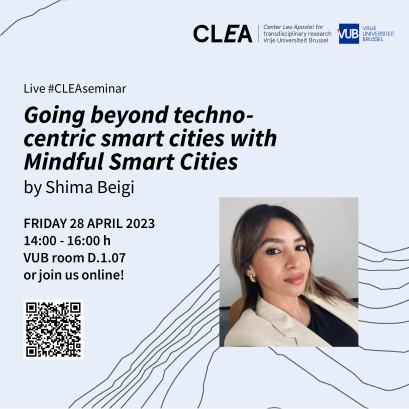 Practical info28/04/2023 - 14:00 - 28/04/2023 - 16:00
Practical info28/04/2023 - 14:00 - 28/04/2023 - 16:00CLEA SEMINAR. Going beyond techno-centric smart cities with Mindful Smart Cities - by Shima Beigi
In techno-centric smart cities, smartness is machine-oriented, externally managed by a few players, algorithmically controlled and undemocratic. This has led to a global counter-smart movement and a growing awareness that building smarter systems takes more than technology. In this seminar, Shima Beigi will offer an action-oriented, therapeutic and alternative pathway for transforming smart cities and improving the life quality of its citizens from the inside out. Called ‘Mindful Smart Cities’, this roadmap is based on the idea that techno-centricity is not a sin per se, but a paradigm. A paradigm can change, but this requires a worldwide systemic change at various layers. FOR MORE INFO > PLEASE CLICK TITLE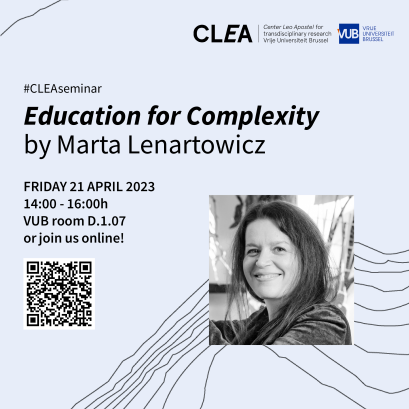 Practical info21/04/2023 - 14:00 - 21/04/2023 - 16:00
Practical info21/04/2023 - 14:00 - 21/04/2023 - 16:00CLEA SEMINAR. Education for Complexity - by Marta Lenartowicz
Context is everything. The same activity, however enriching, can turn detestable once its externalities and consequences are examined. Conversely, a tedious task can become exhilarating when serving a grand purpose. No action, idea, or pursuit in the world is standalone and self-contained. It requires human beings to adequately contextualise and nuance their actions, understandings, ideas, and speech. In other words, to become a generalist, big-picture, multi-level thinker. Today, being such a thinker is no longer merely a cognitive style but a moral duty, challenging for both individuals and for the entire system of education. It requires vast knowledge, plenty of experience, and the ability to apply various insights stemming from various fields. In this seminar, Marta Lenartowicz will address the question of when and how such capabilities might be systematically developed within the trajectory of human life. The six-year cycle of secondary education, which actually aims to provide a multidisciplinary, holistic development, appears to be a perfect window of time for learning to see, understand, and interact with reality as an interconnected, multidimensional whole. FOR MORE INFO > PLEASE CLICK TITLE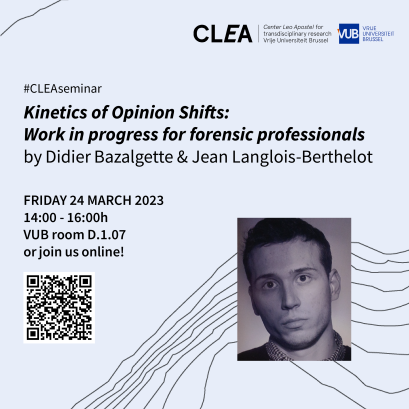 Practical info24/03/2023 - 14:00 - 24/03/2023 - 16:00
Practical info24/03/2023 - 14:00 - 24/03/2023 - 16:00CLEA SEMINAR. Kinetics of Opinion Shifts: Work in progress for forensic professionals - by Didier Bazalgette & Jean Langlois-Berthelot
Decision sciences share common features with physics and biology. The large number of interacting agents renders decision sciences amenable to statistical physics approaches and agent-based models. However, these models generally have low operational applicability. In this seminar, Bazalgette and Langlois-Berthelot will share a work in progress that investigates the "kinetics of opinion shifts" in the context of subversion exposure.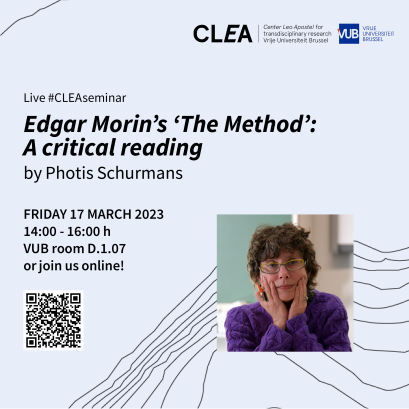 Practical info17/03/2023 - 14:00 - 17/03/2023 - 16:00
Practical info17/03/2023 - 14:00 - 17/03/2023 - 16:00CLEA SEMINAR. Edgar Morin’s ‘The Method’: A critical reading - by Photis Schurmans
The French philosopher and sociologist Edgar Morin worked for almost 30 years on his 2.500-pages masterwork ‘The Method’ (1977-2004). In this seminar, Photis Schurmans will go through the main concepts put forward by Morin to clarify his vision of complex thinking. This lecture intends to be an introduction for those who are not acquainted with Morin’s work.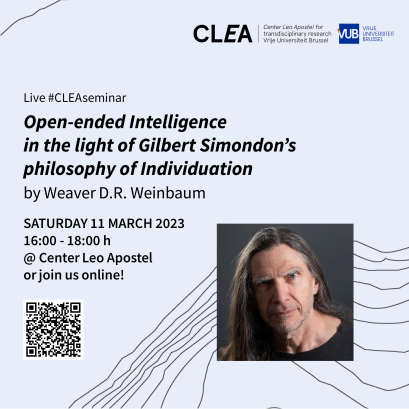 Practical info11/03/2023 - 16:00 - 11/03/2023 - 18:00
Practical info11/03/2023 - 16:00 - 11/03/2023 - 18:00CLEA SEMINAR. Open-ended Intelligence in the light of Gilbert Simondon’s philosophy of Individuation - by Weaver D.R. Weinbaum
Powerful Artificial Intelligence (AI) generative tools such as chatGPT and DALLE-2 are reaching the awareness of the wide public. It is, therefore, high time to deepen our understanding of the generative processes and the philosophical thinking behind them.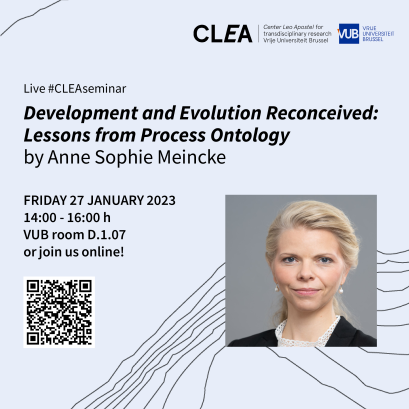 Practical info27/01/2023 - 14:00 - 27/01/2023 - 16:00
Practical info27/01/2023 - 14:00 - 27/01/2023 - 16:00CLEA SEMINAR. Development and Evolution Reconceived: Lessons from Process Ontology - by Anne Sophie Meincke
According to a new movement within the philosophy of biology, living beings shouldn’t be conceived as substances but as processes. This so-called ‘process biology’ draws on process ontology, which is a long but mostly marginalised, philosophical tradition of understanding reality in dynamical terms. In this seminar, Anne Sophie Meincke will show how the right version of process ontology and, hence, of process biology can help improve biological concepts of development and evolution.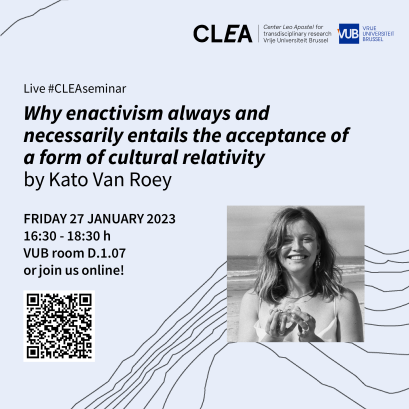 Practical info27/01/2023 - 16:03 - 27/01/2023 - 18:30
Practical info27/01/2023 - 16:03 - 27/01/2023 - 18:30CLEA SEMINAR. Why enactivism always and necessarily entails the acceptance of a form of cultural relativity - by Kato Van Roey
Enactivism is the view that cognition emerges from the interaction between an acting organism and its surroundings. An organism does not passively receive information from its environment, but generates meaning or ‘enacts’ a world through its sensorimotor activity. Enactivists oppose a universalist view on mind and meaning and appeal to context in their attempt to do so, just like cultural relativists do. In this presentation, Kato Van Roey will clarify how enactivism and cultural relativism relate by carefully scrutinizing their similarities and differences. Van Roey proposes that enactivism necessarily entails a form of cultural relativism because of its focus on context, yet one that is rid of uncomfortable consequences.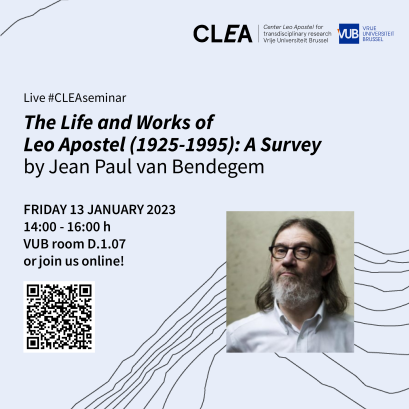 Practical info13/01/2023 - 14:00 - 13/01/2023 - 16:00
Practical info13/01/2023 - 14:00 - 13/01/2023 - 16:00CLEA SEMINAR. The Life and Works of Leo Apostel (1925-1995): A Survey - by Jean Paul van Bendegem
The Center Leo Apostel is named after the Belgian philosopher and logician Leo Apostel, who was a professor at the Vrije Universiteit Brussel and the Ghent University. In this seminar, professor emeritus Jean Paul van Bendegem will give an impression of who Leo Apostel was, both in his life and in his writings, together with some personal recollections. He hopes to show why the research group CLEA is named after him.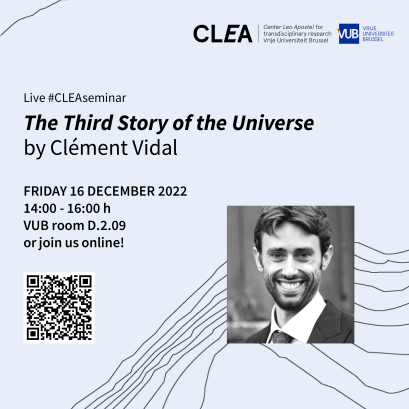 Practical info16/12/2022 - 14:00 - 16/12/2022 - 16:00
Practical info16/12/2022 - 14:00 - 16/12/2022 - 16:00CLEA SEMINAR. The Third Story of the Universe - by Clément Vidal
Where do we come from? Where are we going? What is our role in life? Traditionally, religious worldviews answer such big questions through myths and rituals.
Calendar
February 2026
- Practical info10 February 2026 09:00 - 12 February 2026 18:00
- Practical info26 February 2026 16:00 - 26 February 2026 17:00
